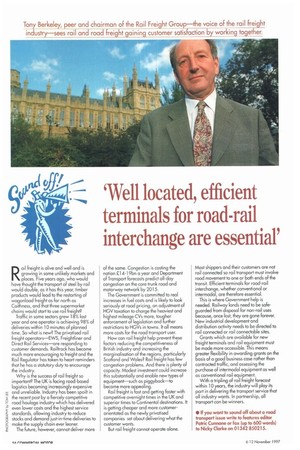Tony Berkeley, peer and chairman of the Rail Freight Group—the
Page 58

If you've noticed an error in this article please click here to report it so we can fix it.
voice of the rail freight industry—sees roil and road freight gaining customer satisfaction by working together.
'Well located, efficient terminals for road-rail interchange are essential'
Rail freight is alive and well and is growing in some unlikely markets and places. Five years ago, who would have thought the transport of steel by rail would double, as it has this year, timber products would lead to the restarting of wagonload freight as far north as Caithness, and that three supermarket chains would start to use rail freight?
Traffic in some sectors grew 18% last year and one operator is achieving 98% of deliveries within 10 minutes of planned time. So what is new? The privatised rail freight operators—EWS. Freightliner and Direct Rail Services—are responding to customer demands RaiItrack has become much more encouraging to freight and the Rail Regulator has taken to heart reminders that he has a statutory duty to encourage the industry. Why is the success of rail freight so important? The UK is facing road-based logistics becoming increasingly expensive and unreliable. Industry has been spoilt in the recent past by a fiercely competitive road haulage industry which has delivered even lower costs and the highest service standards, allowing industry to reduce stocks and demand just-in-time deliveries to make the supply chain ever leaner. The Future, however, cannot deliver more
of the same. Congestion is costing the nation El 4-19bn a year and Department of Transport forecasts predict all-day congestion on the core trunk road and motorway network by 2015.
The Government is committed to real increases in Fuel costs and is likely to look seriously at road pricing, an adjustment of HGV taxation to charge the heaviest and highest mileage CVs more, tougher enforcement of legislation and further restrictions to HGVs in towns. It all means more costs For the road transport user.
How can rail freight help prevent these Factors reducing the competitiveness of British industry and increasing the marginalisation of the regions, particularly Scotland and Wales? Rail freight has few congestion problems. And there is plenty of capacity. Modest investment could increase this substantially and enable new types of equipment—such as piggyback—to became more appealing. Rail freight is fast and gettHng faster with competitive overnight times in the UK and superior times to Continental destinations. It is getting cheaper and more customerorientated as the newly privatised companies set about delivering what the customer wants.
But rail freight cannot operate alone. Most shippers and their customers are not rail connected so rail transport must involve road movement to one or both ends of the transit. Efficient terminals for road-rail interchange, whether conventional or intermodal, are therefore essential.
This is where Government help is needed. Railway lands need to be safeguarded From disposal for non-rail uses because, once lost, they are gone forever. New industrial development and distribution activity needs to be directed to rail connected or rail connectable sites.
Grants which are available for new freight terminals and rail equipment must be made more accessible. This means greater flexibility in awarding grants on the basis of a good business case rather than contracted traffic, and assessing the purchase of intermodal equipment as well as conventional rail equipment. With a tripling of rail freight forecast within 10 years, the industry will play its part in delivering the transport service that all industry wants. In partnership, all transport can be winners.




















































































































